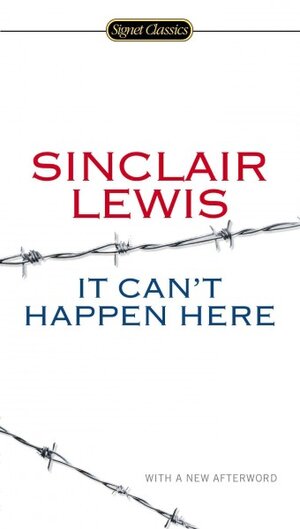Sinclair Lewis (1885-1951) was the first American to win the Nobel Prize for Literature (1930) and his body of work was often satirically critical of American capitalism and materialism. He was married for a time to Dorothy Thompson, a very well known political columnist who actually interviewed Adolf Hitler. I had heard that this book, widely read when it was written in 1935, had gained a new audience with the election of Trump and so was pleased my book group selected it for March. In this dystopian alternative history, it feels like you could substitute Trump's name for that of the target character, Berzelius "Buzz" Windrip, and have it fit. Windrip runs on a populist platform, promising "every real American family" $5,000. Doesn't this sound like it could have come from Trump himself when Windrip claims to have "thoroughly tested (but unspecified) plans to make all wages very high
and the prices of everything produced by these same highly paid workers
very low; that he was 100 per cent for Labor, but 100 per cent against
all strikes; and that he was in favor of the United States so arming
itself, so preparing to produce its own coffee, sugar, perfumes, tweeds,
and nickel instead of importing them, that it could defy the World ...
and maybe, if that World was so impertinent as to defy America in turn
... he might have to take it over and run it properly." He will bring back the good old days when white men were supreme. He beats out two other candidates for President (including FDR) and begins to take apart the government and remake the country the way he wants it run. He disempowers Congress. He recruits loyalists to run the new jurisdictions created when he abolishes traditional states. And he enforces his suppression of dissent, especially of the press, via a group of armed thugs called Minutemen and by imprisoning anyone who disagrees with him. Windrip also disenfranchises women and minorities (notably African Americans and Jews). Another striking parallel, as noted in a review by the New York Times, is that Windrip's right hand man, Lee Sarason, "believes in propaganda, not information, openly arguing that 'it
is not fair to ordinary folks — it just confuses them — to try to make
them swallow all the true facts that would be suitable to a higher class
of people.'” And the similarities continue: Windrip does not fulfill his promises, walking away from the "Forgotten Men," and turning on his own allies and supporters. Again from the NYT review, "As president, he insists on absolute obedience, 'louder, more convincing Yeses from everybody about him.'”
The complacent liberals also become targets of Lewis' ire. Doremus Jessup, editor of a small town newspaper in New England, eventually tries to warn people of the rising threat of a fascist type government, but ends up in prison for his trouble. Dissidents, including Trowbridge, escape to Canada and create a type of underground railroad system to help others leave. As in the book, people today will probably claim that such events couldn't happen here, but New York Times columnist David Brooks recently noted (Mar. 5, 2018, "The Chaos After Trump") that a significant percentage of young people have lost faith in the democratic form of government. "In the U.S., nearly a quarter of millennials think democracy is a bad way to run a country. Nearly half would like a strongman leader. One in six Americans of all ages supports military rule." Sobering and scary, but worth the read. Here is a link to a current re-print of Time magazine's review of the book when it was written. Additional reviews from The Guardian, and The National Book Review (via The Huffington Post).
The complacent liberals also become targets of Lewis' ire. Doremus Jessup, editor of a small town newspaper in New England, eventually tries to warn people of the rising threat of a fascist type government, but ends up in prison for his trouble. Dissidents, including Trowbridge, escape to Canada and create a type of underground railroad system to help others leave. As in the book, people today will probably claim that such events couldn't happen here, but New York Times columnist David Brooks recently noted (Mar. 5, 2018, "The Chaos After Trump") that a significant percentage of young people have lost faith in the democratic form of government. "In the U.S., nearly a quarter of millennials think democracy is a bad way to run a country. Nearly half would like a strongman leader. One in six Americans of all ages supports military rule." Sobering and scary, but worth the read. Here is a link to a current re-print of Time magazine's review of the book when it was written. Additional reviews from The Guardian, and The National Book Review (via The Huffington Post).

No comments:
Post a Comment